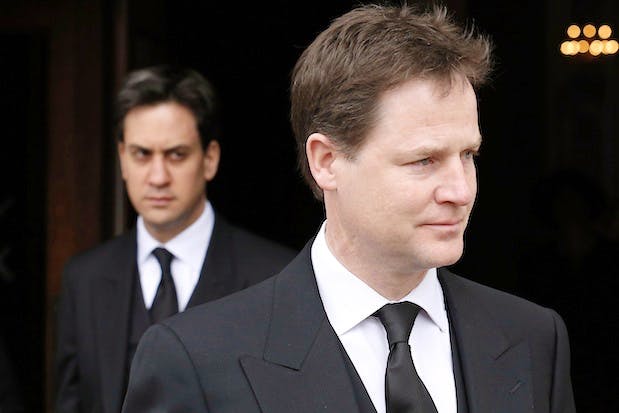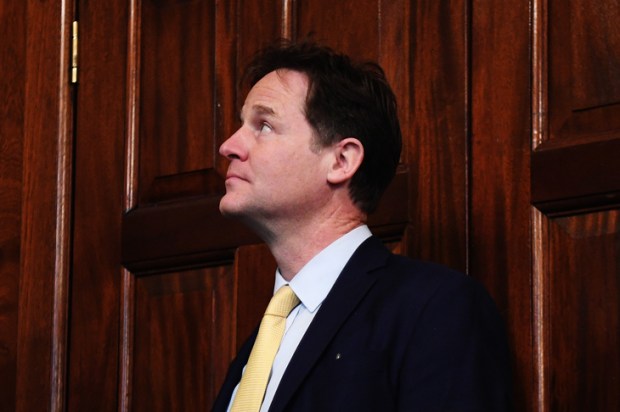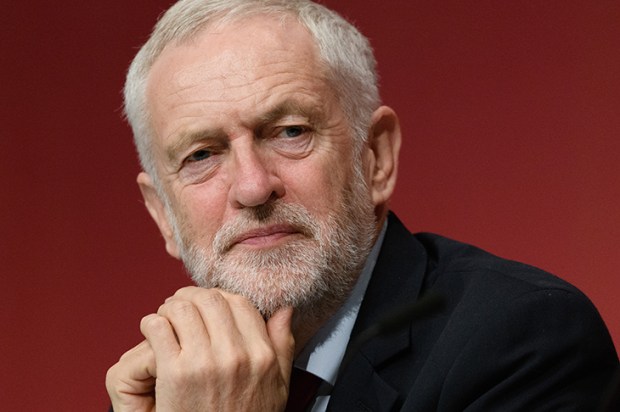I write this in Glasgow, at the Lib Dem conference. Nick Clegg has invented a constitutional doctrine. The doctrine teaches that after a general election, the party that comes third (should it have cohabitation in mind) must first approach the party that won the most seats. But there is no such rule. Our unwritten constitution is clear, minimal and simple. Any two parties jointly capable of commanding a Commons majority have an effective right to form a government together whenever they wish. That right is born of their joint ability to bring down any other government on the instant.
So after the general election in 2015, unguided by the rule book, Mr Clegg and his party may have to make a primitive choice. The choice would be made, I submit, on the basis of two considerations of which the second is less mentioned than the first, but (I’d argue) of greater importance.
The first consideration for a suitor-hunting third party is to ask which candidate shares more of its beliefs, aims and policies. The second is to ask which is in practice going to be easier to live with. The parallels with bed-sharing go deeper than the obvious jokes.
First, then, policy. I shall leave to others the study of what is the political equivalent of comparative religion, remarking only that — as with comparative religion — it is not enough to make lists. Lists may adumbrate the particular overlaps while overlooking profound differences of a more general nature. In its particulars a 21st-century Liberal Democrat Bible will share much ground with a modern Labour party Koran. In recent decades a strong strand of statism has woven itself into Lib Dem ideas for government. Wealth redistribution, taxation, welfare, health and European cooperation all find the Lib Dems more often on Labour’s side of the fence than the Tories’; and the weakening of the ancient Liberal hostility to collective labour has relegated perhaps the most significant historical difference.
It follows that if after the next election Nick Clegg sits down with Ed Miliband, each with a list of his party’s preferred, cherished and ‘die in the trench for’ policies, both men will be able to tick many of each other’s boxes. But could they work together easily? I submit not. I’d go further: for the minority party, a coalition cabinet with Labour would be hell. I think Nick Clegg knows that, but do lesser Lib Dems have the least idea of how aghast their leadership would be at an invitation to Ed Miliband’s and Ed Balls’s table?
The breathless media metaphor of rows and splits notwithstanding, working in cabinet with the Conservative leadership has proved unexpectedly possible, even amicable, for Lib Dems — and vice-versa. Much has been written, about the good relations between David Cameron, Mr Clegg, George Osborne, Danny Alexander, and lesser players on both sides. Less has been written about why this has proved the case.
I’ll take a stab, which you may dismiss as psychobabble. It is of course true that many (not all) of the senior Lib Dems in the government come from what might loosely be called the right-wing — or ‘old-fashioned Liberal’ — part of their party: believers in fiscal prudence, individual liberty and personal responsibility who are sceptical about state intervention. But still one should not overlook or discount the philosophical differences: Clegg finds not just the particulars but the drift of a good deal of Tory thinking infuriating, believing it brutal and stupid. Senior Lib Dems regard the parliamentary Conservative party as an object of horror. Yet when it comes to the battles to which these differences should surely lead… they so often don’t; or don’t quite boil over; or are smoothed away; or parked; or fizzle out.
Why? I don’t suppose Messrs Osborne or Cameron will care for my analysis, but I suspect the reason why peace keeps breaking out is that in the end, and in part of his soul, a good Tory believes that nothing matters much, and it’s all a game. Such people are super to work with. In a deep and (to me) admirable sense — and in the phrase Mr Cameron used to me when he first mentioned that he might try for the leadership of his party — these men are taking a pop at it. They do have ideals of course, they do care, they do love their country and they do have aims they hope to achieve; but if it all goes tits-up (a phrase they use often) they’ll walk away. There are other things in their lives. This isn’t all they ever wanted. They can give and take; they’re allergic to entrenched positions; they tend not to take things personally; they can deal with the Devil himself, if they must.
Among gay men there’s a well-known way of trying to guess whether another male is straight or gay. You just try to picture him with a woman. Can you? It’s surprising how often this turns out to yield an accurate result. In the 18 months remaining, Lib Dems could usefully amuse themselves by picturing private scenes from a coalition cabinet with Labour. Tim Farron with Harriet Harman; David Laws with Ed Balls; Nick Clegg with Ed Miliband; Norman Lamb with Maria Eagle… it just doesn’t work.
Something would stand out every time: Labour heavyweights would find it impossible to regard a Liberal Democrat as a proper colleague. In their hearts they would see them as interlopers: politicians who shouldn’t be there; zombies without socialist souls. Harold Wilson may have oversimplified when he said that Labour was a crusade or it was nothing, but he touched on something true. The intensity with which Labour politicians hate each other bears witness to the sacred nature of their cause. Labour in local government or in alliance in Scotland against the jointly detested SNP is capable of day-to-day cooperation with Lib Dems… but in the cockpit of the British nation? Flying the plane? No boy or girl from a good socialist home could think this was what their party was in politics to do. It would feel all wrong. Both partners might theoretically be pulling in the same direction: the physics might be right. But the chemistry would be wrong.
And in the end it wouldn’t work. I’d give it eight months. I bet Nick Clegg knows this, but do his party?
Got something to add? Join the discussion and comment below.
Get 10 issues for just $10
Subscribe to The Spectator Australia today for the next 10 magazine issues, plus full online access, for just $10.















Comments
Don't miss out
Join the conversation with other Spectator Australia readers. Subscribe to leave a comment.
SUBSCRIBEAlready a subscriber? Log in